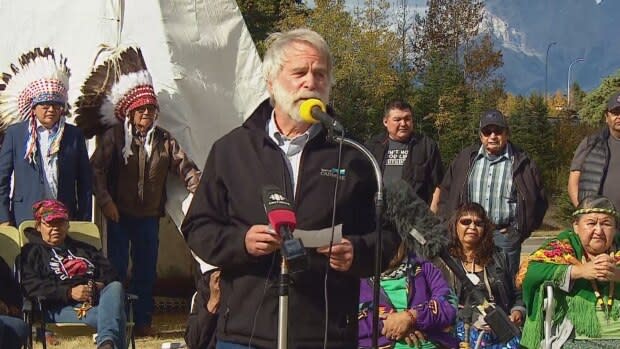Racist nickname for mountain landmark renamed by Stoney Nakoda women
The chiefs and elders of the Stoney Nakoda Nation have revealed a new name for a mountain peak near Canmore that has long been referred to by a derogatory slur.
The mountain, which is located near the summit on Mount Charles Stewart, has been known since the 1920s as S--w's T-t.
Una Wesley, an elder women with the Stoney Nakoda Nation who took part in the renaming ceremony, says that when she first heard the name of the mountain, it reminded her of her life in residential schools.
"I grew up in the residential school and discrimination. This is 2020 and women should be honoured," she said at the Canmore Visitor Centre on Tuesday.
She says the recent backlash prompted her and others to take the lead in renaming the peak and honour it at a ceremony.

"I want the younger generation to know the history of the people and it will give us more strength and more courage to be proud of who we are," she said.
The new name for the mountain is Bald Eagle Peak, which in the Stoney Nakoda language is Anûkathâ Îpa.
Wesley says the name is meant to recognize the Stoney women who are historically known as warriors and healers.
"They were cherished, loved and were treated kindly. That's why I thought about the history of the Stoney and where I got all these stories from."
The First Nation elders say while the name is new to the general public, it's something their ancestors have been using all along.
Another elder with the Stoney Nakoda Nation, Buddy Wesley, says the occasion is a milestone for truth and reconciliation.
"This mountain is very sacred to us and it's been a long time coming," he said at the Tuesday ceremony, where the new name was announced.
"This [old name] is hurtful to many tribes across Canada, especially all the Indigenous women, so we are going to counteract with the name that has been in existence."
These elders are working with volunteers to apply to the Alberta Geographical Names Program with the new name in the hopes it will catch on.

Canmore Mayor John Borrowman said at the ceremony that it is important to have the province assign an official name to the landmark.
"It's been known for decades by an unofficial name that is both racist and misogynistic. It is so embarrassing and wrong for our society and culture to perpetuate that," he said.
"We thank the Stoney Nakoda for bringing a proper name forward to the peak, one that acknowledges and celebrates the long history here of the First Nations people."
In the works since 2014
Two Alberta lawyers, Jude Daniels and Natasha Egan, have been working since 2014 to find a formal name for the landmark.
"(We) are just disgusted by the name," Egan said in an interview from Calgary.
"Colloquially, people call it 'The T-t.' So the racism was dropped but the misogyny remains."
The word s---w came from the Algonquin language and once simply meant woman, but the word has evolved into a term to disparage Indigenous women.
Egan said she and Daniels, who is Metis and works with Aboriginal communities, spoke to the province and the Stoney Nakoda Nation to help bring forward a traditional Indigenous name for the landmark.
There have been two recent attempts to officially name the peak, but the Alberta Historical Resources Foundation board rejected both.
Ron Kelland, a historical places research officer and geographical program co-ordinator with Alberta Culture, said the first suggestion used the second half of the current name.
"For obvious reasons, the board did not find that acceptable," he said.
Another proposal suggested the spot be called Mother's Mountain, but Kelland said that was also rejected because the board wanted to pursue a traditional or Indigenous name.
The derogatory nickname is used in several hiking and climbing guides, on Google Maps and on many trail websites — although Egan said it's been changed on some. She and Daniels have been waiting for a new name before addressing the issue with Google.
Egan said the push for an official name has taken on an even stronger meaning with ongoing protests over Black and Indigenous rights across the United States and Canada.
"There's been an awakening in our country and south of us," she said. "We have a real opportunity.
"It may be symbolic … but it's important. Words hurt. Words matter."

